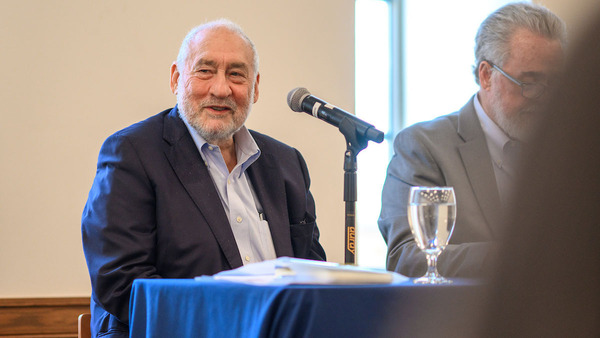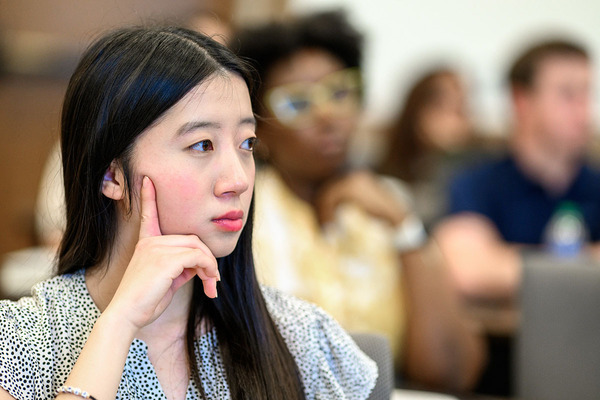Nobel laureate Joseph Stiglitz addresses inequality with a people-centered economy

Inequality is a policy choice — not an inevitable outcome — and can be addressed through economic approaches that prioritize human dignity, economist and Nobel laureate Joseph E. Stiglitz said during a recent visit to the University of Notre Dame’s Keough School of Global Affairs.
Stiglitz, a Columbia University professor and former chief economist at the World Bank, met with faculty and students as well as Keough School and Notre Dame leadership during his April 15 visit to campus, during which he delivered the inaugural Joseph E. Stiglitz Lecture on Inequality and the Good Society.
The new lecture series, made possible with support from the Ford Foundation, was organized by Ray Offenheiser, director of the Keough School’s McKenna Center for Human Development and Global Business. The series is dedicated to bringing outstanding scholars to Notre Dame to share groundbreaking scholarship and policy insights on inequality and is a part of larger strategic efforts by the school and the University to address global poverty.
Watch a discussion between Joseph Stiglitz and Ray Offenheiser on global inequality here.
Rules create structural inequality
During his public remarks, Stiglitz outlined the ways inequality is written into the rules of the U.S. and global economies by powerful interests that prioritize profit.
“Markets don’t exist in a vacuum,” Stiglitz said. “We structure our market with rules and regulations. Rules matter for creating inequality. [In the United States], we’ve frankly made a choice to have more inequality than other countries.”
In the United States, some 40 years of neoliberal — or free-market-oriented — economic policies have bolstered corporations and lowered the living standards of everyday people, Stiglitz said. In particular, rules have weakened antitrust protections and permitted monopolies; weakened worker bargaining power, ensuring that wages haven’t kept pace with profits; crafted bankruptcy laws that favor companies while forcing bankrupt consumers to repay student loans; and allowed corporations to pay low taxes while enjoying massive profits.

As a result, Stliglitz said, the United States has less economic mobility than peer countries — meaning that for U.S. residents, life outcomes are more dependent on their parents’ income and education levels than they are for people in other wealthy countries.
These regressive policy choices are reinforced by the United States’ political system, Stiglitz said, where Supreme Court decisions like Citizens United have given corporations more power to make political donations and shape the rules in their favor. And inequality remains a problem globally as well, he said: Multinational corporations lobby to keep their tax rates low, and the international debt architecture favors wealthy creditors over cash-strapped countries that slash public spending in order to afford high debt payments.
Ultimately, the inequality created by these systems and structures threatens the future of democracy, Stiglitz said, adding that widespread dissatisfaction leaves voters vulnerable to demagogues who mislead the public and discard democratic norms.
Prioritizing human dignity: Policy and practice
While Stiglitz was unsparing in his critique of the status quo, he also expressed optimism that voters and policymakers could make different choices and reframe how they think about and discuss the concept of freedom. He urged audience members to think of freedom not as fewer government regulations but rather as the opportunity for everyday people to live a good life.
“Freedom should be about human dignity and human flourishing,” Stiglitz said.
Such an approach — one that prioritizes the needs of marginalized people and communities — made Stiglitz a natural fit to inaugurate the Keough School’s new inequality lecture series, said Scott Appleby, the Marilyn Keough Dean of the Keough School.
“Confronting inequality can make us uncomfortable because it may challenge us personally to face some hard facts about our economic system and who it benefits at the expense of others,” Appleby said.
“But such moral and intellectual discomfort may be just the challenge we all need. Indeed, commitment to human dignity and intellectual development challenges us to examine those social structures and systems that explain and sustain the marginalization of the poor, and to pursue policies and practices that would create a more equitable and just world.”
Watch the full lecture here.
Originally published by Josh Stowe at keough.nd.edu on April 22.
Contact: Tracy DeStazio, associate director of media relations, 574-631-9958 or tdestazi@nd.edu
Latest Colleges & Schools
- Faculty receive prestigious early career awards from National Science FoundationDuring the 2024-25 academic year, four researchers in the University of Notre Dame’s Colleges of Engineering and Science received early-career awards from the National Science Foundation.
- ‘Prebunking’ false election claims may boost trust in electionsIn recent years, democracies worldwide have seen a growing erosion of trust in election outcomes and institutions, driven in part by fears of widespread fraud. New Notre Dame research finds that “prebunking” — providing accurate information before false claims spread — boosts trust in elections more effectively than traditional fact-checking.
- Justice Amy Coney Barrett to deliver Center for Citizenship and Constitutional Government lectureAmy Coney Barrett, associate justice of the Supreme Court of the United States, will speak at the University of Notre Dame at 4 p.m. Sept. 12 in the Leighton Concert Hall of the DeBartolo Performing Arts Center.
- Three Notre Dame researchers win NEH grants for humanities-based projectsDavid Hernandez, the Eli J. and Helen Shaheen Associate Professor of Classics, and Morgan Munsen, senior research and partnerships program manager at the Nanovic Institute for European Studies in the Keough School of Global Affairs, have each won an NEH Collaborative Research grant. Thomas A. Stapleford, associate professor in the Program of Liberal Studies, is leading a team that has been awarded a Humanities Research Center on Artificial Intelligence grant.
- Open-access database offers insights into U.S. congressional candidatesEach election cycle, thousands of candidates vie for seats in the U.S. House of Representatives and the Senate. Until now, there has been no comprehensive, publicly available resource cataloging what those candidates say about who they are or what they stand for. A new open-access database called CampaignView, created by researchers at the University of Notre Dame, offers researchers, journalists and educators a powerful tool to understand congressional elections.
- First impressions count: How babies are talked about during ultrasounds impacts parent perceptions, caregiving relationshipPsychologist Kaylin Hill studied the impact of a parent’s first impression of their baby during an ultrasound exam. The words used by the medical professional to describe the baby (positive or negative) influence how the parents perceive their baby, relate to them after they're born and even how that child behaves as a toddler. The research has broad implications for how we train medical professionals to interact with expectant parents, as well as how we care for parents during the perinatal period when they are most susceptible to depression.













